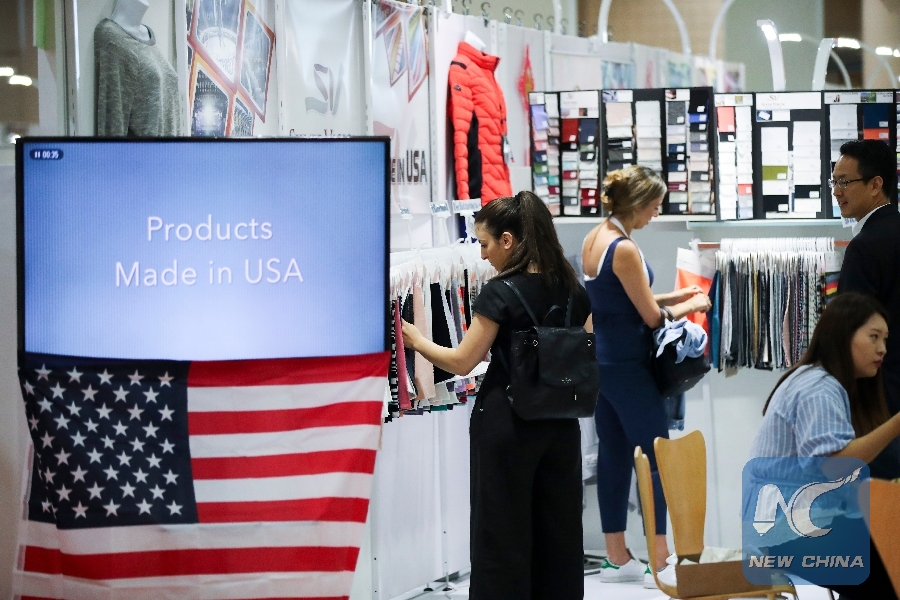
File Photo: Buyers look at exhibits of a U.S. producer at the Chinese Textile and Apparel Trade Show in New York, the United States, July 23, 2018. (Xinhua/Wang Ying)
BEIJING, Sept. 19 (Xinhua) -- Despite global outcries, Washington has just amped up its rhetoric and ramped up its tariffs against China yet again.
In a statement issued Monday, U.S. President Donald Trump announced that his government would impose 10-percent tariffs on roughly 200 billion U.S. dollars' worth of imports from China starting on Sept. 24, and expand the levy to 25 percent beginning Jan. 1.
Part of Washington's rationale for this is the belief that its tariff tactics will have grueling consequences for the Chinese economy; as such, China would agree to make more concessions -- only to play into Washington's hands.
However, this U.S. assumption is based on a lack of understanding of China's economy and policies.
With an annual decline in the share of foreign trade in the whole Chinese economy, China is consolidating the fundamental role that domestic consumption plays in its growth. In the first half of 2018, China's gross domestic product increased by 6.8 percent, overshadowing that of most major economies in the world. Domestic consumption contributed 78.5 percent to the growth rate.
Meanwhile, Beijing is continuing to steadily promote a reform and opening-up and adopting measures to stabilize the market.
China's stable environment for foreign investment, measures to facilitate business, transparent policies along with a vast consumer market continue to make it a coveted target for global businesses, all adding up to its confidence in confronting Washington's unilateral and protectionist moves.
China's policies on trade facilitation and investment liberalization, in sharp contrast to the U.S. strategy, have been well received around the globe.
U.S. multinationals such as Tesla and ExxonMobil have announced huge investment programs in China recently, casting ballots of confidence in favor of Beijing.
In fact, Washington's approach of imposing tariffs will not solve the China-U.S. trade disputes, but harm the interests of U.S. businesses and consumers instead and add downside risks to the global economy.
The latest report by the American Action Forum, a Washington-based nonprofit issue advocacy organization, showed that the upcoming tariffs could raise overall costs for both U.S. consumers and businesses by roughly 19.7 billion dollars per year.
In a letter to the U.S. Trade Representative by 150 industrial associations earlier this month, the organizations representing agriculture, retailers, manufacturers, technology and other industries say that "continuing the tit-for-tat tariff escalation with China only serves to expand the harm to more U.S. economic interests, including farmers, families, businesses and workers."
On the ground, unilateral tariff onslaughts have never prevailed in U.S. history. It is time for the Trump administration to take a rational approach to China-U.S. trade relations and frictions and engage with China as an equal partner to solve trade-related issues.

